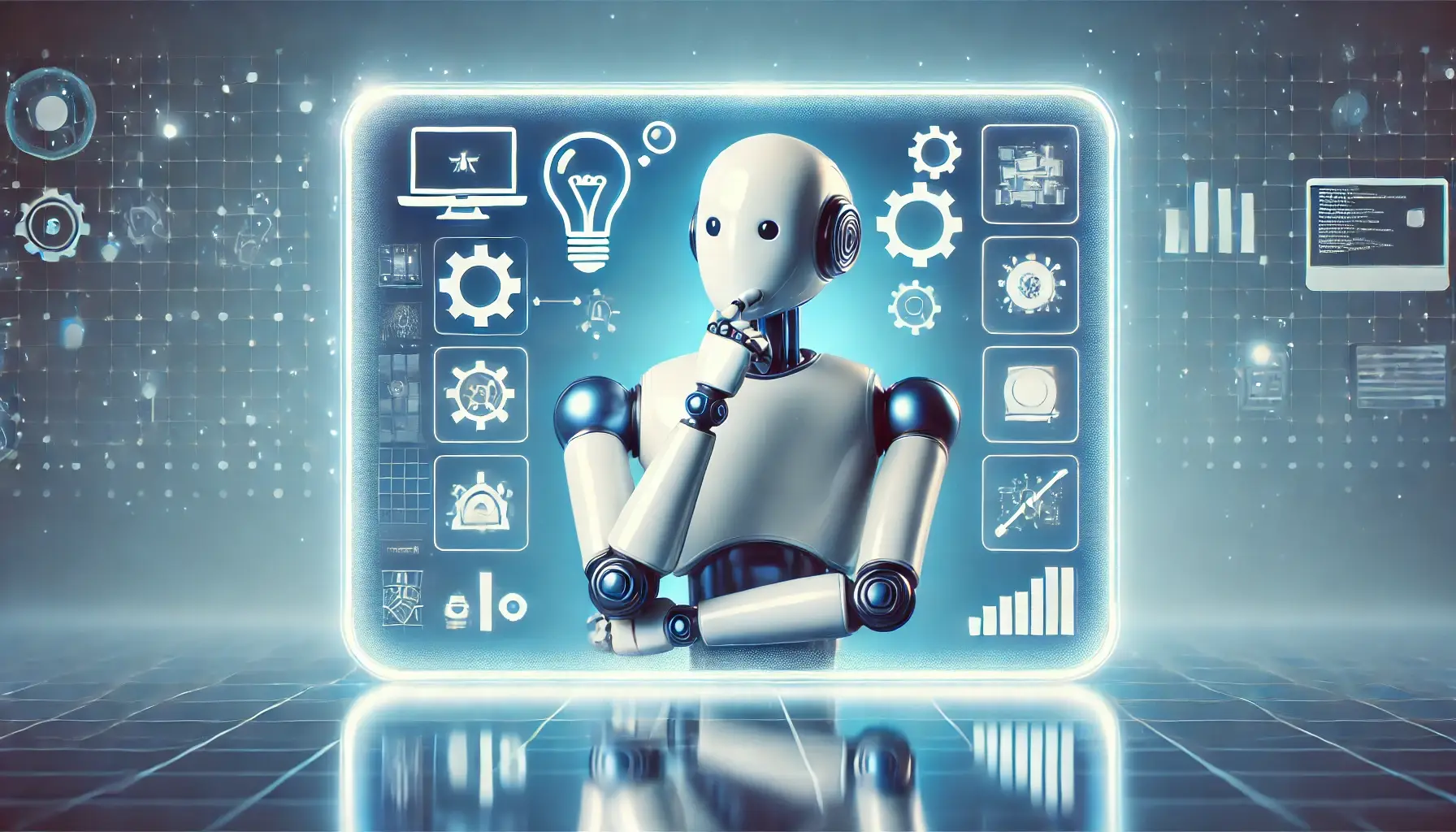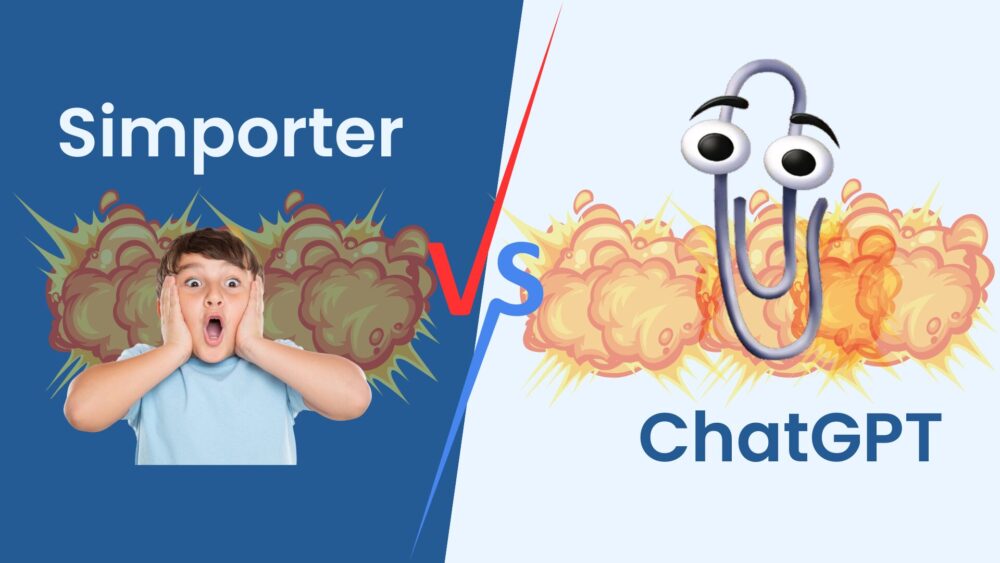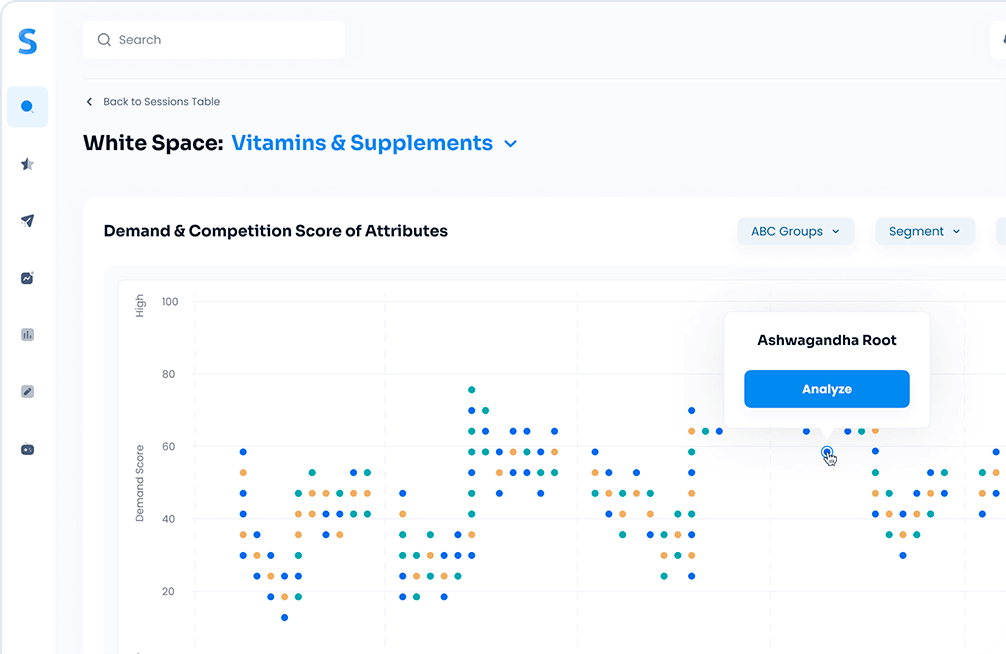AI concepts impact the way enterprises think about products and customer experiences. Machine learning helps spot trends, and AI generates new product ideas, allowing companies to fill market gaps and launch products faster. In this FAQ, you’ll find a breakdown of key AI concepts and how industries like Consumer Packaged Goods (CPG) use AI to stay ahead with smarter product innovation.
- 1. What are AI concepts?
- 2. How do AI concepts help businesses innovate?
- 3. What is machine learning, and how is it used in product development?
- 4. How do neural networks contribute to AI-generated ideas?
- 5. What is deep learning, and how does it power AI creativity?
- 6. What is natural language processing (NLP), and how does it help in ideation?
- 7. How does reinforcement learning help in decision-making and concept generation?
- 8. What are AI-generated product concepts?
- 9. How does Simporter use AI for product ideation?
- 10. What is the difference between AI concepts and AI-generated product concepts?
- 11. How does AI help companies create new product ideas?
- 12. What are some examples of AI-generated product ideas?
- 13. Can AI predict consumer trends for new product ideas?
- 14. How does AI help businesses stay ahead of competitors?
- 15. How does AI-generated ideation work in the CPG industry?
- 16. How do businesses validate AI-generated product ideas?
- 17. What role does data play in AI-generated product concepts?
- 18. How does AI improve product innovation?
- 19. Can AI help create personalized product concepts?
- 20. How can AI help reduce the time it takes to develop a new product?
- 21. How does AI help with product testing?
- 22. What is the role of AI in predicting market demand?
- 23. How does AI help businesses spot market gaps?
- 24. What are the challenges of using AI for product ideation?
- 25. How does AI ideation help businesses adapt to changing consumer demands?
- 26. Can AI help improve sustainability in product development?
- 27. How do AI tools ensure the originality of generated product concepts?
- 28. How does AI integrate with existing product development processes?
- 29. How does AI use consumer data to suggest new product ideas?
- 30. How can AI-generated ideas be validated for market potential?
- 31. How does AI-generated ideation help with product differentiation?
- 32. Can AI predict product success before a launch?
- 33. How does AI help businesses find untapped consumer needs?
- 34. How does AI ideation help businesses respond to changing market conditions?
- 35. How does AI balance creativity and data-driven insights in product ideation?
- 36. How does AI help companies create product ideas that fit local markets?
- 37. How do AI-generated ideas influence a company’s product roadmap?
- 38. Can AI-generated product ideas be customized for different consumer segments?
- 39. How does AI-generated ideation reduce the cost of product development?
- 40. How does AI help with sustainable product design?
- 41. How does AI analyze consumer feedback to create better products?
- 42. How do AI tools ensure that product ideas are aligned with market demand?
- 43. How can AI help businesses create products faster?
- 44. How does AI create data-driven insights to support product ideation?
- 45. How does AI ideation support long-term product innovation?
- 46. How does AI help businesses create product concepts for emerging markets?
- 47. How does AI improve the success rate of new products?
- 48. How can AI help with product customization?
- 49. How does AI-generated ideation improve product-market fit?
- 50. How does AI-generated ideation reduce risk in product development?
- 51. How do AI-generated product ideas shape the future of innovation?
- Conclusion:
1. What are AI concepts?
AI concepts refer to the core ideas behind artificial intelligence, like machine learning, neural networks, and natural language processing. These concepts allow machines to make decisions, recognize patterns, and predict outcomes. AI concepts help businesses solve problems faster and more efficiently by analyzing data and suggesting solutions based on what the data reveals.
2. How do AI concepts help businesses innovate?
AI concepts allow businesses to analyze data quickly and identify trends that humans might miss. By using AI, businesses can spot new opportunities, improve customer experiences, and develop better products. AI also speeds up the decision-making process, allowing companies to bring innovative ideas to market faster and stay ahead of competitors.
3. What is machine learning, and how is it used in product development?
Machine learning (ML) is a form of AI that allows computers to learn from data without explicit programming. In product development, ML analyzes customer behavior and preferences to suggest features that will likely succeed. Businesses use this data-driven approach to improve product designs and meet customer demands more effectively.
4. How do neural networks contribute to AI-generated ideas?
Neural networks are AI systems modeled after the human brain. They analyze large amounts of data to find patterns and relationships that help businesses come up with new ideas. In product ideation, neural networks can suggest innovations or improvements based on trends and consumer feedback that humans might not notice.
5. What is deep learning, and how does it power AI creativity?
Deep learning is a type of machine learning that uses multiple layers of processing to make complex decisions. It’s particularly useful in tasks like image recognition or language processing. For businesses, deep learning helps generate creative product ideas by analyzing huge datasets, identifying trends, and making connections between consumer preferences and market opportunities.
6. What is natural language processing (NLP), and how does it help in ideation?
Natural language processing (NLP) is the part of AI that understands and processes human language. Businesses use NLP to analyze customer feedback, reviews, and social media conversations to uncover new product ideas. NLP helps companies identify common complaints, emerging trends, or popular features, guiding them toward successful product concepts.
7. How does reinforcement learning help in decision-making and concept generation?
Reinforcement learning is a form of AI where systems learn through trial and error. In product development, it helps businesses optimize processes or products by testing different approaches and learning from the outcomes. This method can suggest the most effective product ideas or marketing strategies based on real-time feedback from consumers or markets.
8. What are AI-generated product concepts?
AI-generated product concepts are new ideas for products or features that AI systems create by analyzing data, customer feedback, and trends. AI tools can predict what consumers will want next, allowing businesses to innovate faster. These concepts can range from new product flavors to completely new categories based on market gaps.
9. How does Simporter use AI for product ideation?
Simporter uses AI to help companies generate and validate product ideas by analyzing data from multiple sources, like social media, sales data, and customer feedback. This helps businesses identify trends and market gaps faster. By leveraging AI, Simporter can recommend new product ideas, packaging, or marketing strategies that align with consumer needs.
10. What is the difference between AI concepts and AI-generated product concepts?
AI concepts are the core technologies behind AI, like machine learning and neural networks. These are tools that allow AI systems to process information. AI-generated product concepts, on the other hand, are the new ideas for products or features that AI systems create using those tools. The concepts refer to the tech, while product concepts refer to what the tech creates.
11. How does AI help companies create new product ideas?
AI helps companies create new product ideas by analyzing trends, customer feedback, and market data. AI systems can find patterns that suggest what products or features will be popular. This allows businesses to react to changes in consumer preferences faster and come up with product ideas that are more likely to succeed.
12. What are some examples of AI-generated product ideas?
Examples of AI-generated product ideas include new beverage flavors based on rising health trends or packaging designs that meet consumer demands for sustainability. AI can also suggest new features in tech products or recommend variations of existing products to cater to different markets. These ideas come from analyzing data like sales trends and customer reviews.
13. Can AI predict consumer trends for new product ideas?
Yes, AI can predict consumer trends by analyzing large sets of data, including social media posts, sales figures, and online reviews. By finding patterns in this data, AI can suggest which products or features are likely to trend next. This allows companies to get ahead of trends and create products that match future demand.
14. How does AI help businesses stay ahead of competitors?
AI helps businesses stay ahead by quickly analyzing market data, identifying emerging trends, and suggesting new products or strategies. While competitors might rely on traditional methods like surveys, AI can instantly process real-time data, allowing companies to react faster. This gives them an advantage in creating products that resonate with consumers.
15. How does AI-generated ideation work in the CPG industry?
In the Consumer Packaged Goods (CPG) industry, AI-generated ideation analyzes consumer preferences, market trends, and competitor activity to suggest new product ideas. AI tools can recommend new flavors, packaging designs, or entirely new products based on what customers are buying or asking for. This helps companies create products that align with consumer demands.
16. How do businesses validate AI-generated product ideas?
Businesses validate AI-generated product ideas by testing them with real consumers or comparing them to market data. AI can simulate market conditions or analyze historical data to see if the idea is likely to succeed. This allows companies to tweak the concept before launch, reducing the risk of failure.
17. What role does data play in AI-generated product concepts?
Data is the backbone of AI-generated product concepts. AI systems rely on large datasets to analyze consumer behavior, sales trends, and competitor products. By processing this data, AI can identify patterns and suggest new products that are likely to succeed in the market. The more data AI has, the better its predictions.
18. How does AI improve product innovation?
AI improves product innovation by analyzing data faster than humans can. It helps businesses spot trends, test new ideas, and make better decisions based on real-time information. AI can recommend new product features or entirely new products, helping companies bring innovations to market quicker and with more accuracy.
19. Can AI help create personalized product concepts?
Yes, AI can create personalized product concepts by analyzing individual customer preferences. For example, in the beauty industry, AI can suggest personalized skincare products based on a customer’s skin type, previous purchases, and feedback. This level of customization makes products more appealing to consumers and helps companies stand out in a competitive market.
20. How can AI help reduce the time it takes to develop a new product?
AI helps reduce product development time by automating the research process. It can analyze data, find trends, and suggest product ideas much faster than traditional methods. Instead of spending months researching and testing ideas, AI can generate and validate product concepts in days, helping companies get products to market faster.
21. How does AI help with product testing?
AI helps with product testing by simulating how new products might perform in the market. It can compare AI-generated product ideas with existing products and consumer preferences to predict success. Businesses use this data to make adjustments before launching, which reduces the risk of failure and saves time on unnecessary product iterations.
22. What is the role of AI in predicting market demand?
AI plays a key role in predicting market demand by analyzing historical data, customer behavior, and current trends. AI tools can forecast how many units of a product might sell based on factors like seasonality or changes in consumer preferences. This allows businesses to adjust production and marketing strategies accordingly.
23. How does AI help businesses spot market gaps?
AI helps businesses spot market gaps by analyzing trends, consumer behavior, and competitor products. It identifies areas where consumer demand is high, but supply is low, suggesting opportunities for new products. Businesses can use AI to develop product ideas that meet these unmet needs, gaining an edge over competitors.
24. What are the challenges of using AI for product ideation?
Challenges of using AI for product ideation include data quality, integration with existing systems, and interpreting AI-generated insights. If the data is incomplete or outdated, AI may suggest irrelevant or inaccurate ideas. Additionally, businesses need the right tools and expertise to properly analyze and act on the insights AI provides.
25. How does AI ideation help businesses adapt to changing consumer demands?
AI ideation helps businesses quickly respond to changing consumer demands by analyzing data in real time. AI tools can track trends and consumer feedback to suggest new product features or modifications. This allows businesses to adjust their product offerings faster than traditional market research methods, keeping them competitive in dynamic markets.
26. Can AI help improve sustainability in product development?
Yes, AI can improve sustainability by suggesting eco-friendly alternatives in product design and materials. It can analyze market trends to suggest packaging designs that use less plastic or ingredients that are environmentally friendly. AI can also identify wasteful processes in product development and recommend more sustainable practices.
27. How do AI tools ensure the originality of generated product concepts?
AI tools ensure originality by analyzing a wide range of data, from consumer preferences to competitor products. By spotting patterns and gaps in the market, AI can suggest product ideas that haven’t been tried yet. This helps businesses create unique products that stand out from the competition and meet untapped consumer needs.
28. How does AI integrate with existing product development processes?
AI integrates with existing product development processes by working alongside traditional methods. Companies can use AI to enhance brainstorming sessions, market research, and product testing. AI speeds up data analysis, helping businesses make better decisions faster. It doesn’t replace human creativity but offers data-driven insights to guide product development.
29. How does AI use consumer data to suggest new product ideas?
AI analyzes consumer data, such as reviews, purchase history, and social media trends, to spot patterns in behavior and preferences. It uses this information to suggest new products or features that match what consumers want. AI can identify popular trends or preferences before they peak, helping businesses create products consumers will likely buy.
30. How can AI-generated ideas be validated for market potential?
AI-generated ideas are validated by comparing them to market data. AI tools can simulate how products might perform based on consumer behavior, market conditions, and historical trends. Companies can also test these ideas with focus groups or pilot launches to gather real-world feedback before fully committing to production.
31. How does AI-generated ideation help with product differentiation?
AI-generated ideation helps businesses stand out by identifying unique product ideas that competitors haven’t tapped into yet. AI can analyze data from multiple sources to spot gaps in the market or suggest features that will set a product apart. This helps businesses create differentiated products that appeal to specific consumer needs.
32. Can AI predict product success before a launch?
Yes, AI can predict product success by analyzing factors such as consumer demand, competitor offerings, and historical sales data. AI tools use this information to forecast how a product will perform in the market. This helps businesses adjust product features or marketing strategies before launching, reducing the risk of failure.
33. How does AI help businesses find untapped consumer needs?
AI helps businesses find untapped consumer needs by analyzing consumer behavior and feedback across different platforms, including social media, online reviews, and purchasing data. AI tools can identify patterns that point to unmet needs or desires, helping companies create products that solve these pain points before competitors can respond.
34. How does AI ideation help businesses respond to changing market conditions?
AI helps businesses respond to changing market conditions by providing real-time data analysis. AI tools can track consumer behavior and preferences as they shift, offering new product ideas or adaptations based on these changes. This allows businesses to pivot quickly and stay relevant in dynamic markets where consumer preferences are constantly evolving.
35. How does AI balance creativity and data-driven insights in product ideation?
AI complements human creativity by offering data-driven insights that inform creative decisions. While AI analyzes patterns and suggests ideas based on data, humans interpret these insights and apply creativity to bring them to life. AI doesn’t replace the creative process but enhances it with actionable information.
36. How does AI help companies create product ideas that fit local markets?
AI can tailor product ideas to fit local markets by analyzing regional consumer behavior, preferences, and trends. Businesses can use AI to discover local tastes or preferences that may differ from broader trends. This allows them to create products that resonate with specific regions or cultures, helping them succeed in diverse markets.
37. How do AI-generated ideas influence a company’s product roadmap?
AI-generated ideas can shape a company’s product roadmap by suggesting new products or features that align with consumer demand. By analyzing data, AI tools help businesses prioritize which ideas to develop first, helping them stay ahead of trends and competitors. This data-driven approach helps companies plan for future product launches more effectively.
38. Can AI-generated product ideas be customized for different consumer segments?
Yes, AI-generated product ideas can be customized for different consumer segments by analyzing data specific to each group. For example, AI can generate different product variations for young adults versus older consumers, based on their preferences and buying habits. This helps companies target their products more effectively across diverse markets.
39. How does AI-generated ideation reduce the cost of product development?
AI-generated ideation reduces costs by speeding up the research process and minimizing trial and error. AI analyzes data quickly, allowing businesses to test and validate product ideas without the need for costly, lengthy market research. By predicting which ideas will succeed, AI helps businesses avoid investing in products that are unlikely to sell.
40. How does AI help with sustainable product design?
AI helps with sustainable product design by suggesting eco-friendly materials, packaging, and processes. It can analyze trends in consumer demand for sustainable products and recommend design choices that reduce environmental impact. AI can also identify inefficient processes in manufacturing and suggest greener alternatives, helping businesses improve sustainability.
41. How does AI analyze consumer feedback to create better products?
AI analyzes consumer feedback from sources like reviews, surveys, and social media posts to identify common complaints or preferences. By finding patterns in this data, AI can suggest improvements to existing products or generate new product ideas that address consumer pain points. This helps companies create products that better meet consumer needs.
42. How do AI tools ensure that product ideas are aligned with market demand?
AI tools ensure product ideas are aligned with market demand by continuously analyzing real-time data from consumers, competitors, and sales trends. AI compares new product ideas against current market conditions to determine their potential success. This allows businesses to adjust their concepts to better fit what consumers are likely to buy.
43. How can AI help businesses create products faster?
AI helps businesses create products faster by automating the research and testing processes. AI tools can quickly analyze data, generate ideas, and predict product success, cutting down the time it takes to move from concept to production. This acceleration allows businesses to bring new products to market more quickly than competitors.
44. How does AI create data-driven insights to support product ideation?
AI creates data-driven insights by processing large sets of data, such as customer behavior, sales trends, and market conditions. These insights help businesses understand what consumers want, identify gaps in the market, and generate product ideas that are likely to succeed. Data-driven insights give companies a clearer direction during product ideation.
45. How does AI ideation support long-term product innovation?
AI ideation supports long-term innovation by continuously analyzing consumer trends and behaviors. As market conditions change, AI helps businesses stay ahead by suggesting new product ideas that match these shifts. This constant stream of data-driven suggestions allows companies to adapt and innovate continuously, ensuring long-term success in their product development efforts.
46. How does AI help businesses create product concepts for emerging markets?
AI analyzes economic data, consumer behavior, and local trends to suggest product ideas for emerging markets. By understanding these unique conditions, AI can help businesses tailor their products to meet the specific needs and preferences of consumers in these markets, giving them a competitive edge when entering new territories.
47. How does AI improve the success rate of new products?
AI improves the success rate of new products by analyzing historical data, market trends, and consumer preferences to predict which ideas are most likely to succeed. By testing and refining ideas before launch, AI reduces the risk of failure and helps businesses invest in products that are more aligned with consumer demand.
48. How can AI help with product customization?
AI helps with product customization by analyzing individual consumer data and preferences to suggest personalized product options. For example, AI can recommend skincare products based on a customer’s specific skin type or dietary supplements tailored to individual health goals. This level of personalization enhances the consumer experience and increases product appeal.
49. How does AI-generated ideation improve product-market fit?
AI-generated ideation improves product-market fit by aligning product ideas with real consumer needs and preferences. AI analyzes data to suggest products that match market demand, ensuring that new launches are more likely to succeed. This reduces the risk of launching products that don’t resonate with the target audience.
50. How does AI-generated ideation reduce risk in product development?
AI reduces risk by predicting product success based on historical data, consumer behavior, and market trends. It can spot potential issues early, allowing businesses to refine product ideas before investing significant resources. This data-driven approach minimizes the chances of product failure, helping companies make smarter decisions.
51. How do AI-generated product ideas shape the future of innovation?
AI-generated product ideas shape the future of innovation by offering a faster, data-driven way to create new products. As AI continues to evolve, it will help businesses tap into consumer desires, spot trends earlier, and bring innovative products to market faster than ever before. AI makes product development more agile and precise, leading to a future where businesses can continuously innovate with greater success.
Conclusion:
AI offers businesses a unique advantage by generating product ideas that match market demand, helping them stay ahead of competitors. From analyzing consumer preferences to predicting future trends, AI-powered tools like Simporter enable companies to innovate quickly and efficiently. By leveraging AI-generated ideas, businesses can develop better products and ensure long-term success in rapidly changing markets.
To see Simporter’s platform in action, sign up for a demo here.









